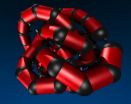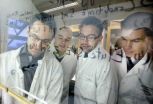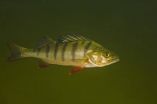(Press-News.org) Chemists at the University of Liverpool have created a new technique that could be used in industry to separate complex organic chemical mixtures.
Chemical feedstocks containing benzene are used extensively in industry to create modern materials and polymers. Their use relies heavily on distillation techniques which separate complex mixtures into more simple molecules used as building blocks to develop drugs, plastics and new materials. These distillation techniques can be expensive and involve large amounts of energy for hard-to-separate mixtures.
A team of researchers at the University's Department of Chemistry, led by Professor Andrew Cooper, have created organic molecular crystals that are able to separate important organic aromatic molecules by their molecular shape.
Professor Cooper said: "We were able to demonstrate this new molecule separation technique by synthesising porous organic cage molecules that are highly similar in shape to the molecules that need to be separated.
"The holes in these cage molecules act like a shape-selective molecular sieve, rather like a children's wooden shape puzzle. Using computer simulations we revealed how the porous cages separate the aromatic feedstocks and show that, unlike a wooden shape puzzle, the mechanism actually involves flexibility and motion in the cage sieves. "
The ability to separate complex molecules using less energy will be important in the future for current petrochemical and chemical industries and for producing any next-generation sustainable bio-derived chemicals.
###The findings are part of a five-year research programme in new materials discovery, funded by the Engineering and Physical Sciences Research Council (EPSRC) and are published in Nature Chemistry.
Chemists develop single molecule sieves to separate complex molecular mixtures
2013-02-15
ELSE PRESS RELEASES FROM THIS DATE:
Rutgers physicists test highly flexible organic semiconductors
2013-02-15
Organic semiconductors hold promise for making low-cost flexible electronics – conceivably video displays that bend like book pages or roll and unroll like posters, or wearable circuitry sewn into uniforms or athletic wear. Researchers have demonstrated the ability to "print" transistors made of organic crystals on flexible plastic sheets, using technology that resembles inkjet or gravure printing.
However, for the technology's potential to be realized, scientists have to show that these organic semiconductors will withstand the rugged handling they invite – they will ...
Extreme winters impact fish negatively
2013-02-15
Wcologists from Umeå University and the Norwegian University of Science and Technology in Trondheim have studied fish communities and fish habitat and reviewed the importance of winter conditions for fish in streams and rivers in cold regions. The findings are now being published in the journal BioScience.
It is well known that winter can be a stressful season for plants and animals in streams and rivers. It is reasonable to assume that more extreme weather conditions are the most taxing, but the ecological significance of this is poorly understood.
The research team, ...
UC research takes a new approach to identifying 'food deserts'
2013-02-15
University of Cincinnati-led research takes a new direction in examining the availability of healthy foods for urban populations by examining the commuting patterns of its residents.
This new approach to identifying so-called food deserts, now published online, will appear in the May journal of Health and Place.
Neighborhoods without access to stores that provide healthy food options – such as fresh fruits and vegetables – are often labeled as food deserts. However, current methods for determining which neighborhoods have access to nutritious foods focus only on where ...
Nano-machines for 'bionic proteins'
2013-02-15
This press release is available in German.
Physicists of the University of Vienna together with researchers from the University of Natural Resources and Life Sciences Vienna developed nano-machines which recreate principal activities of proteins. They present the first versatile and modular example of a fully artificial protein-mimetic model system, thanks to the Vienna Scientific Cluster (VSC), a high performance computing infrastructure. These "bionic proteins" could play an important role in innovating pharmaceutical research. The results have now been published in ...
Study finds possible link between diabetes and increased risk of heart attack death
2013-02-15
Having diabetes doubles a person's risk of dying after a heart attack, but the reason for the increased risk is not clear. A new University of Iowa study suggests the link may lie in the over-activation of an important heart enzyme, which leads to death of pacemaker cells in the heart, abnormal heart rhythm, and increased risk of sudden death in diabetic mice following a heart attack.
"Many studies have shown that patients with diabetes are at especially high risk for dying from a myocardial infarction (heart attack). Our study provides new evidence that this excess ...
Wild plants are infected with many viruses and still thrive
2013-02-15
UNIVERSITY PARK, PA. -- Researchers have studied viruses as agents of disease in humans, domestic animals and plants, but a study of plant viruses in the wild may point to a more cooperative, benevolent role of the microbe, according to a Penn State virologist.
"Most of these wild plants have viruses," said Marilyn Roossinck, professor of plant pathology and environmental microbiology and biology, who has examined more than 7,000 individual plants for viruses. "But they don't have any of the symptoms that we usually see in crop plants with viruses."
Most of the viruses ...
Technique that removes additional toxins prolongs dialysis patients' lives
2013-02-15
Highlights
A technique that removes additional toxins during dialysis decreased kidney failure patients' risk of dying from any cause by 30% over three years.
The technique also reduced patients' risk of dying from heart-related causes or infections.
15% to 25% of dialysis patients die annually.
Washington, DC (February 14, 2013) — A technique that removes additional toxins during dialysis may prolong kidney failure patients' lives, according to a clinical trial appearing in an upcoming issue of the Journal of the American Society Nephrology (JASN). In light of ...
Accelerated protons confirm origin of cosmic rays
2013-02-15
We are constantly being bombarded by speedy, energetic, and yet unassuming, particles called cosmic rays. These charged particles (mostly protons), continuously assail the Earth from outer space. There is general consensus among scientists that supernova remnants (the leftovers of a supernova explosion) are the sources of cosmic rays, but the final proof has been elusive since cosmic rays are deflected on their way from the source to Earth.
A new study offers conclusive evidence that cosmic ray protons within our galaxy are accelerated in the shock waves produced by ...
Fish become bolder and more gluttonous from drug residue
2013-02-15
Anxiety-moderating drugs that reach waterways via wastewater create fearless and asocial fish that eat more quickly than normal. These behavioral changes can have serious ecological consequences. This is shown by Umeå University researchers in the prestigious journal Science.
Many drugs leave our bodies unaffected, and residues from them are therefore found in wastewater. Low concentrations of drugs are often found downstream from sewage treatment plants. Today we test how dangerous drugs are to humans, but our knowledge of the environmental impacts of drugs is limited. ...
Mood-modifying drugs for humans also alter fish behavior
2013-02-15
Pharmaceutical drugs that end up in the world's waterways after being excreted, flushed and treated at wastewater treatment plants may lead to unexpected ecological impacts, according to a new study of wild European perch. Tomas Brodin and colleagues from Umeå University in Sweden discovered that the fish ate faster, became bolder and acted less social after being subjected to an anxiety-moderating drug, known as Oxazepam.
The psychiatric drug is used to treat anxiety in humans. But, Oxazepam residues often wind up in natural aquatic systems, downstream from sewage treatment ...



